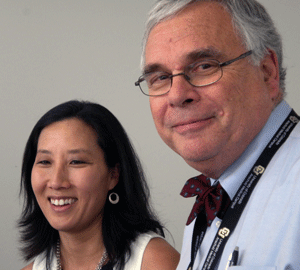Rural Health Scholars 20th Anniversary
School of Medicine
Tonia Twichell Aurora (
Aurora (
Looking back at the School of Medicine program’s genesis, Kang remembers the dearth of rural doctors as being one of the era’s many pressing concerns. She had participated in a student-run group during her undergraduate years at Stanford University, and she knew she wanted to start something similar at CU.
So Kang created Rural Health Scholars in 1992, her first year of medical school, with the backing of the school, AHEC
After the first year, Kang handed the program off to younger classmates as she headed into
“You only get one summer before you start spending time in hospitals,” says Kang, who practices at The Children’s Hospital of Philadelphia. “That made the continuity a challenge. I did not conceive that it would be around this long. I think it’s a testament to these medical students that they want to do something meaningful."
Frank Hill, a third-year medical student, is one of many program graduates grateful for its longevity. He participated while a high school student in
“I loved everything about it," he says. "Even on Sundays when we had a day off, I’d study the material because I wanted to learn everything.”
He knew he was interested in health care before participating that summer but says the program helped him focus on medicine.
“And it motivated me to stay on track in college. A lot of classes are not as interesting as pathology and other subjects you learn in medical school, but I got a taste of medicine through the program, and it helped me to stay with it. The lecturers are awesome, the material is great. I remember it being life-changing.”
Some of the medical school counselors wrote letters of recommendation that helped him get a full scholarship to
“I could ask them what I should be doing, what classes I should be taking to make me competitive,” he says. “I think I would have gone into the health care field
Hill was one of a few former program directors who attended a celebration Friday at Anschutz Medical Campus to mark the 20th anniversary of the program and to recognize Kang for her initiative. Also attending was Dean Richard Krugman, who has made sure the program has had financial support for the past 20 years,
The program now runs for three weeks instead of five, as the funding has not increased in the past 20 years, and the bill is now footed entirely by the School of Medicine. But the format is similar to what Kang originated 20 years ago; medical students take care of all the aspects with Associate Dean of Medical Student Affairs Maureen Garrity,
Garrity says one of the reasons the program has remained successful is its transition strategy, which involves choosing two students from the matriculating medical school class, who then participate as counselors and have a year to prepare and recruit for the following summer's program.
Several graduating scholars have entered medicine, but Garrity says no one yet has tracked
“I thought it would be stricter with lots of lessons and lectures. But they made it fun with a lot of interactive lessons,” said Fralick, who lives near Steamboat Springs and wants to go into neonatal nursing.
“We got to go to class and stuff and learn PBL (problem-based learning), but what was really great is they’d do lectures where we’d learn certain things and then the next day we’d shadow people who were doing that same stuff so we’d understand what they were doing,” said Martinez, who comes from Monte Vista and is interested in nursing or respiratory therapy.
As for Kang, who spent several hours with the students on Friday as they went through labs and lessons, she may work in a big city hospital, that doesn’t mean her rural health days are behind her. She sees a lot of non-urban patients in her pediatric palliative care practice.
“A lot of our patients live in rural area so they don’t have access to professionals who have experience with palliative care for kids,” she said. “We operate sort of like an old fashioned family physician practice. We see patients in their home environments, which I think gives you a very different perspective.
“So it has sort of looped around for me.”